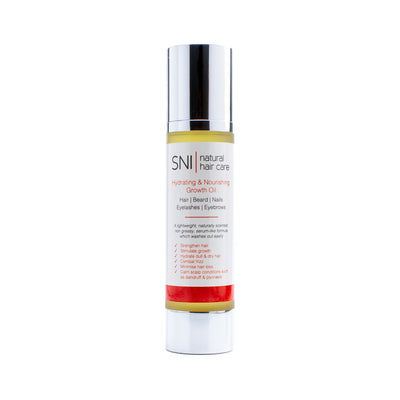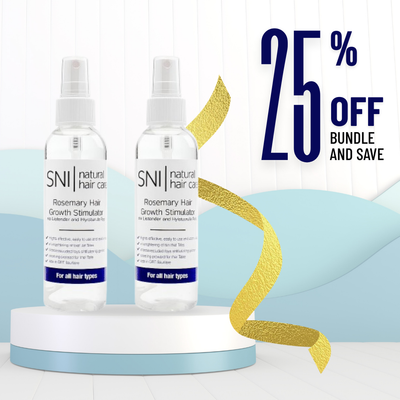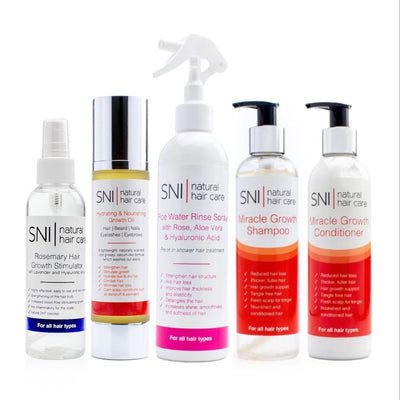Silicone Based Hair Oils: The Truth Revealed

Have you ever picked up a hair oil at your local drugstore and pharmacy and ACTUALLY read the ingredients? If not, then team SNI suggest you do so--not just with hair oils, but other hair products and serums that are out there in the market that can be detrimental to your gorgeous locks. The culprit ingredient in some of these oils and hair products is silicone. Below is an example of the Moroccan Oil, and as you can see Dimethicone (another name for Silicone) is in this product. So what exactly is silicone and why is it harmful?
What is Silicone?
Silicone is a synthetic ingredient that is used in many products and is widely popular in hair care products including conditioners, hair oils, and serums. Silicones go by different names (dimethicone is one of the best-known) and are modified into numerous different formulas.What Do Silicones Do?
Silicones are known to waterproof, retain moisture, adhere colour pigments, protect our hair, and make the application of skincare products feel silky. The skin is not pulled or tugged as it is spread on, and there is no oily or sticky feeling. Silicones give our deodorants that velvety feel, allowing them to dry quickly, and they keep water-resistant sunscreens on our skin, even when we sweat or get wet. Sounds great right? But don't be fooled folks, although this mineral provides a shiny, glossy look to your hair, there are pros and cons to silicone-based products.Pros
The pros of silicone include a shiny luxurious feel to your hair. Damaged hair can actually look healthy with silicone-based products because of the false shine it adds to the hair. Notice how soft your hair feels after you condition your hair? This is because many conditioners contain silicone, hence why beauty experts advise not to apply conditioner on the scalp an just on the ends because conditioning the scalp can cause flat, limp hair. Although shiny hair is a good thing, silicone can “water proof” each strand and can create that glossy effect. The cons section will further explain why this shine is not the shine we want.Cons
The shine you get from silicone-based products might feel great, but those products aren't essentially helping your hair. In fact, silicone is almost like plastic. It is not a natural ingredient, and its side effects are bad for our hair. It gives the hair the illusion of shine, but it is not the shine we want. This is because it is a synthetic shine from the plastic and acts as an adhesive against water and air. This prevents the moisture from getting to the hair shaft, which in turn causes the hair to be an attraction for dirt and buildup, if not washed properly, and can lead to greasy hair. There are a few other downsides too. If you colour treat your hair that waterproof film can reduce the colour uptake. It can also cause additional build-up with any conditioning products you apply. Also, heat treating or blow-drying can bake the silicone into the hair-shaft, making it particularly hard to remove. To wash greasy hair, a double shampoo might be necessary which isn't good either because this can strip the hair of essential oils--creating a horrendous cycle of damage. You will then need to use more products to correct the problem created in the first place, which will be even more detrimental to the scalp. The lack of moisture can cause a dry scalp as well as limp, lifeless, and weighed down hair and can lead to breakage and frizz.What Do experts have to say about Silicones?
Birmingham based hairdresser for Nicky Clarke, Elizabeth Winters, confirms this, saying: "They appear to clean hair and give the feel and appearance of the hair being soft and shiny, they in fact coat the hair over a period of time which prevent moisture from entering the hair, eventually drying it out."How SNI Natural Hair Oil Differs from Market Oils
SNI Natural Hair oils is made of all natural ingredients—and not the synthetic (man-made) materials that are incorporated in other mainstream oils and hair products. This means that SNI Natural hair care is a penetrative formula, so it does not just coat your hair, but instead, gives it that natural, healthy shine. With the SNI Natural Hair Oil, you do not even have to shampoo twice because the oil is a lightweight formula, and is easy to wash out.Now, when silicone based oils are used, they gradually build up, making the hair feel heavy, flat and lifeless. When this happens, the only way to remove this build-up is with a strong, clarifying shampoo. These shampoos are usually sulfate based, meaning they can strip oils from the scalp. When this happens, your scalp can be prone to itching and flaking, and your hair can become rough, dry and frizzy. If you reach for your silicone-based conditioners and serums and you know you’ll be starting the whole stripping-your-hair-of-healthy-oils process all over again.
What can you do to break the damaging cycle?
Team SNI recommends that you stay away from silicone based hair products if you already have scalp problems. it is also recommended to check out the Environmental Working Group Skin Deep database to check if chemicals in your everyday products are harmful to you or your family. Common names for silicone's are:- Cyclomethicone
- Dimethicone
- Methicone,
- Amodimethicone
- Dimethiconol
- Cyclomethicone
- Cyclopentasiloxane




